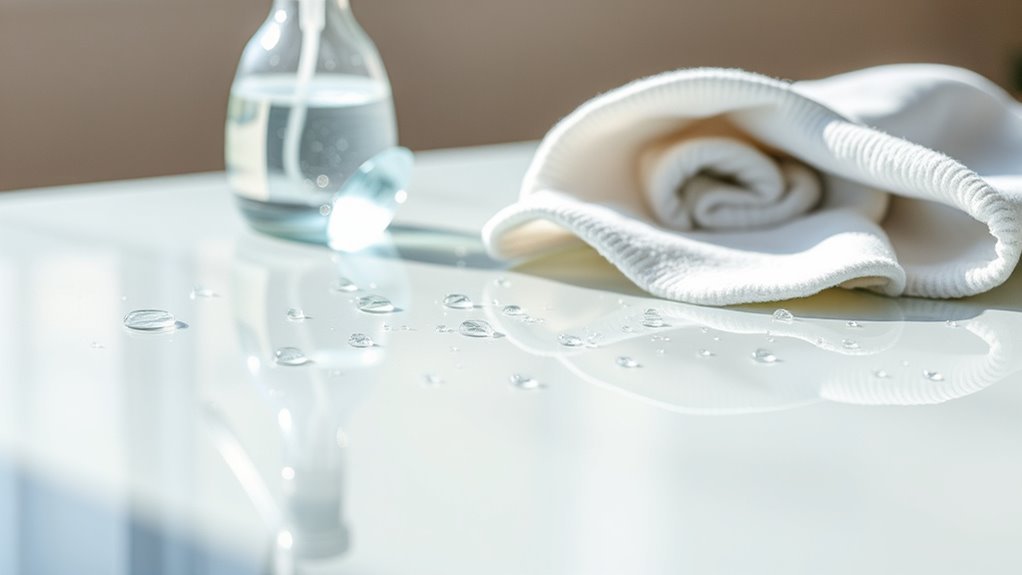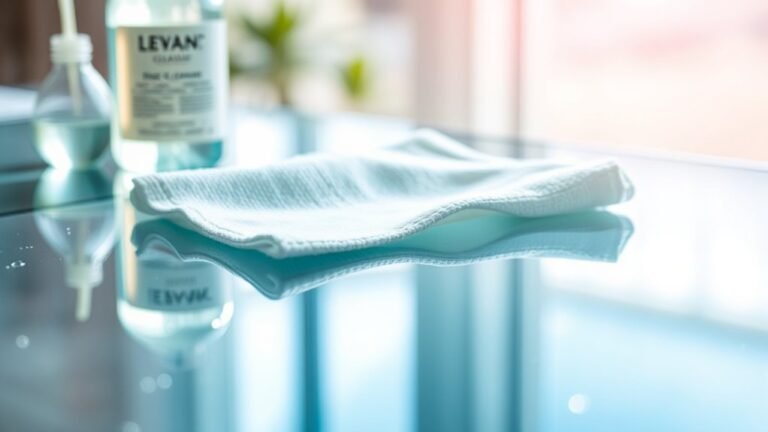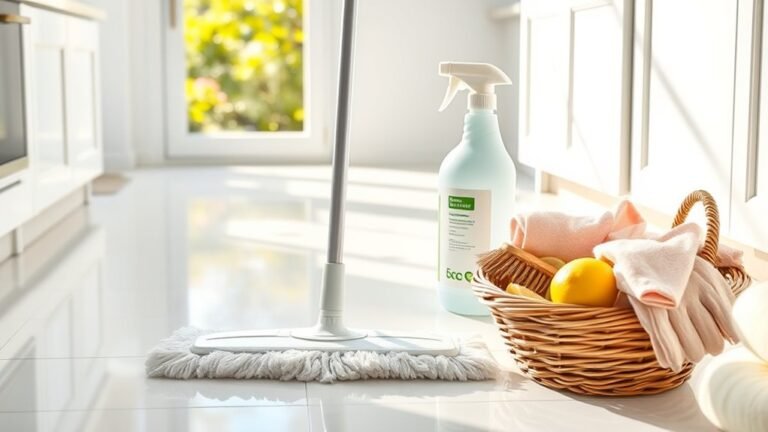Daily Maintenance Tips for Glass
You should dust your glass daily with a microfiber cloth to trap dust without scratching. Clean regularly using a vinegar and water mix for a clear finish, avoiding harsh cleaners or abrasive tools that can damage surfaces. Wipe spills and fingerprints quickly to prevent stains. Also, maintain window tracks with simple cleaning and lubrication. These easy habits keep your glass spotless and functional. Keep going to uncover more helpful tips for sparkling glass care.
Use a Microfiber Cloth for Regular Dusting
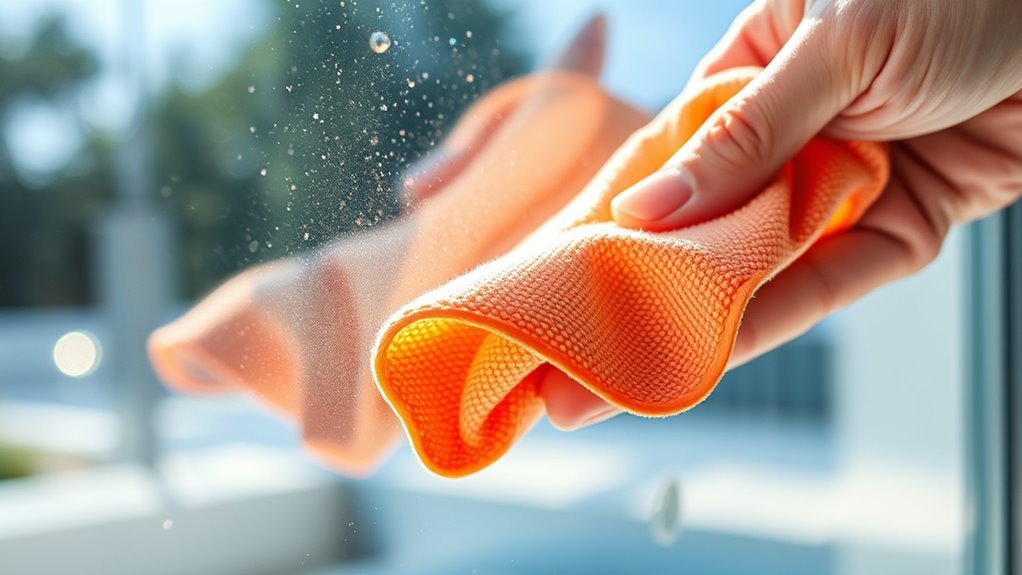
One simple tool you should always keep handy for glass maintenance is a microfiber cloth. Its unique fibers trap dust and dirt without scratching surfaces, making it perfect for your daily routine. You’ll appreciate the microfiber benefits, especially how it lifts particles instead of just pushing them around, leaving your glass spotless and streak-free. When dusting, use gentle, circular dusting techniques to capture every speck without damaging the glass. This approach saves you time and effort, giving you more freedom to enjoy your clean space without hassle. Keep your microfiber cloth clean and dry for best results, and you’ll find that regular dusting becomes a quick, effective habit that protects your glass and enhances your environment effortlessly.
Clean Glass With a Vinegar and Water Solution
You can easily clean your glass surfaces using a simple vinegar and water solution, usually mixed at a 1:1 ratio. Just spray the mixture onto the glass and wipe it down with a microfiber cloth for best results. This method helps remove streaks and grime without harsh chemicals.
Vinegar-to-Water Ratio
Mixing the right vinegar-to-water ratio is key to cleaning glass effectively without leaving streaks or residue. You want to harness vinegar benefits like its natural acidity to break down grime, while considering water quality to avoid mineral deposits. Here’s a simple guide:
- For everyday cleaning, mix 1 part white vinegar with 3 parts water. This balances strength and safety.
- Use a stronger mix—equal parts vinegar and water—for tough stains or grease buildup.
- If your tap water is hard or mineral-rich, try using distilled water to prevent spots and guarantee a crystal-clear finish.
Application Techniques
Spray the vinegar and water solution evenly across the glass surface to guarantee thorough coverage. Using a microfiber cloth or a lint-free paper towel, wipe the glass in a circular motion to lift dirt and grime effectively. For stubborn spots, apply a bit more solution directly and let it sit for a minute before wiping. You can choose from various application methods—spray, wipe, or even use a sponge—depending on the glass size and your comfort. To keep your glass sparkling, maintain a regular cleaning frequency, ideally once a week, or more often if you live in a dusty or humid environment. This straightforward approach not only frees you from harsh chemicals but also assures your glass stays crystal clear with minimal effort.
Avoid Abrasive Cleaners and Tools
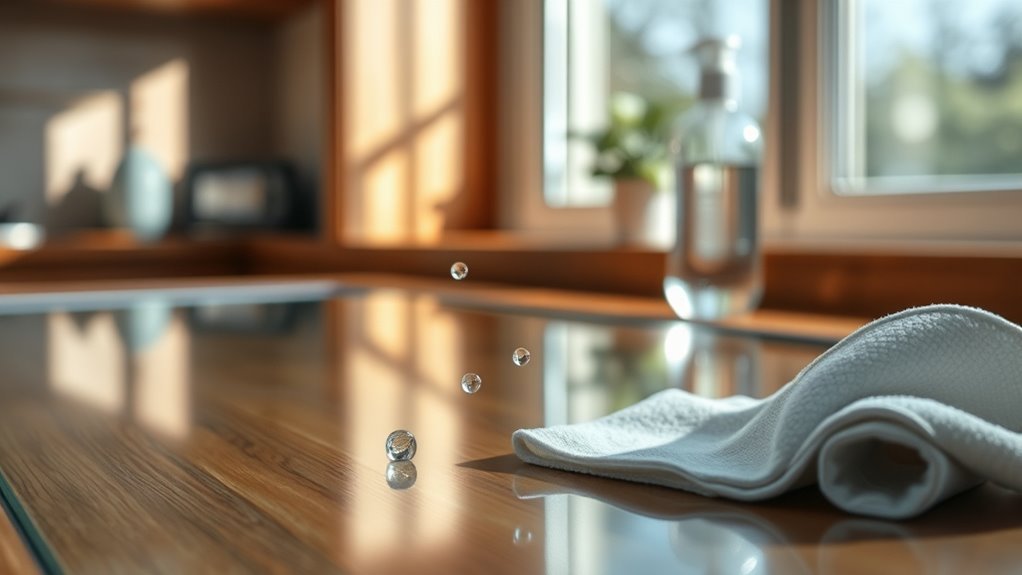
Although it might seem convenient, using abrasive cleaners or tools can quickly damage your glass surfaces. Don’t fall for cleaning myths that suggest scrubbing harder or using rough materials will make glass sparkle more. Instead, protect your freedom to enjoy clear views without surface damage by choosing gentle methods.
Avoid abrasive cleaners and tools; gentle methods protect your glass and keep views crystal clear.
Here’s what you should avoid:
- Steel wool or scouring pads — these scratch easily.
- Harsh chemical powders — they can etch or dull glass.
- Rough brushes or sponges — they wear down protective coatings.
Wipe Spills and Fingerprints Promptly
When spills or fingerprints appear on your glass, wiping them off quickly prevents stains and smudges from setting in. You don’t want to be stuck scrubbing stubborn marks later, so prompt action is key to spill prevention. Keep a soft microfiber cloth handy—it’s perfect for fingerprint removal without scratching the surface. Just a gentle wipe keeps your glass clear and lets natural light flow freely, giving you that open, unfettered feeling you crave. Avoid letting dirt or oils linger; they only make cleaning harder and dull the glass’s shine. By staying on top of spills and fingerprints, you maintain a fresh, spotless view, freeing you from tedious deep cleans and letting you enjoy your space without hassle.
Maintain Window Tracks and Frames
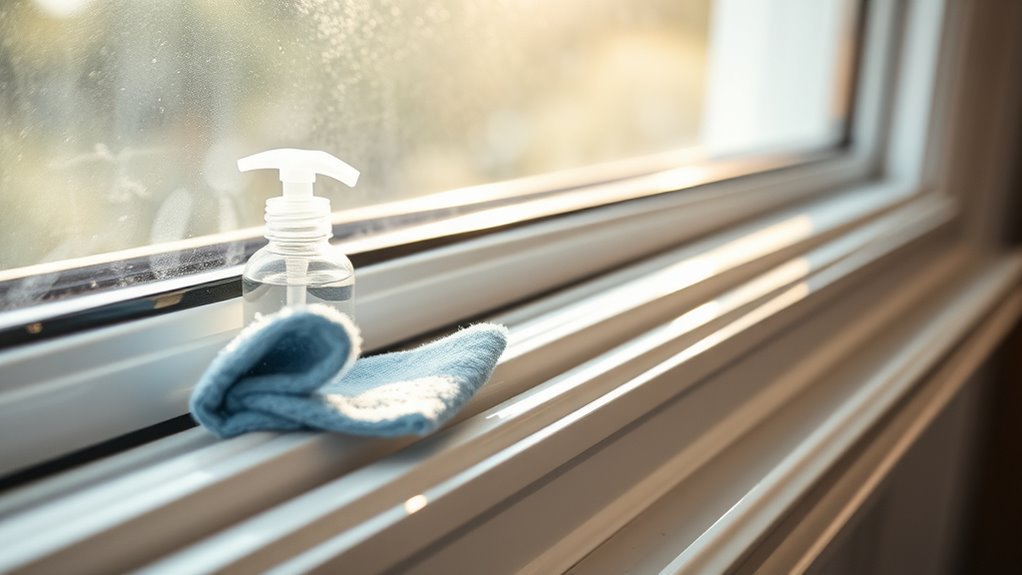
Keeping your window tracks and frames clean is just as important as caring for the glass itself. When you focus on track cleaning and frame upkeep, you guarantee smooth operation and extend their lifespan. Here’s how you can take charge:
- Remove debris from tracks daily using a vacuum or a soft brush to prevent buildup that restricts movement.
- Wipe down frames with a damp cloth and mild detergent to avoid dirt accumulation and maintain appearance.
- Lubricate metal tracks occasionally with a silicone-based spray to keep windows sliding freely without resistance.
Use a Squeegee for Streak-Free Finishes
How can you achieve perfectly clear, streak-free glass every time? Using a squeegee is your best bet. Mastering squeegee techniques not only saves time but guarantees streak prevention, freeing you from endless wiping. Start at the top corner and pull down in straight strokes, wiping the blade after each pass to avoid residue buildup. Avoid circular motions—they cause streaks. Here’s a quick guide to get you started:
| Step | Tip |
|---|---|
| 1. Preparation | Wet glass thoroughly |
| 2. Technique | Use vertical strokes |
| 3. Blade Care | Wipe blade after each stroke |
| 4. Final Touch | Buff edges with microfiber cloth |
With these squeegee techniques, you’ll embrace freedom from streaks and enjoy sparkling glass effortlessly.
Frequently Asked Questions
Can Glass Be Safely Cleaned With Commercial Glass Cleaning Sprays?
You can safely clean glass with commercial glass cleaning sprays, but you’ll want to check if they contain safe ingredients to protect your surfaces and health. Many sprays offer strong cleaning effectiveness without harsh chemicals, giving you freedom from streaks and residue. Just make sure you pick ones labeled non-toxic or eco-friendly. That way, you get a sparkling finish without worrying about damage or harmful fumes.
How Often Should Glass Surfaces Be Deep Cleaned?
Think of your glass surfaces as clear windows to freedom—when they’re spotless, you see the world without barriers. Following frequency guidelines, you should schedule deep cleaning every three to six months to maintain that pristine clarity. This deep cleaning removes stubborn grime that daily wipes miss, letting your space breathe and shine. By committing to these intervals, you embrace a routine that keeps your environment open, crisp, and full of possibility.
Are There Any Natural Alternatives to Vinegar for Cleaning Glass?
If you’re looking for natural alternatives to vinegar for cleaning glass, you’ve got some great options. Citrus solutions, like lemon or orange juice, work wonderfully because their acidity cuts through grime without harsh chemicals. You can also mix baking soda with water to create a gentle abrasive paste that lifts stubborn spots. These choices give you freedom from strong smells and synthetic cleaners, keeping your glass sparkling clean and your space fresh naturally.
What Is the Best Way to Prevent Glass From Fogging?
Did you know fogging can reduce visibility by up to 90%? To keep your glass clear, you’ll want to explore effective fog prevention methods like applying anti fog solutions. These products create a thin, invisible layer that stops moisture buildup, giving you freedom from constant wiping. You can also try simple tricks like keeping air flowing or using a mild soap mix. With the right approach, you’ll enjoy crystal-clear views anytime.
Can UV Light Damage Glass Over Time?
You might wonder if UV exposure can damage glass over time. Generally, glass has great durability and resists UV rays pretty well, so it won’t easily degrade or weaken. However, prolonged exposure to intense UV light can sometimes cause slight discoloration or affect coatings on treated glass. If you want your glass to last and maintain clarity, consider UV-protective films or treatments that help preserve its strength and appearance.
